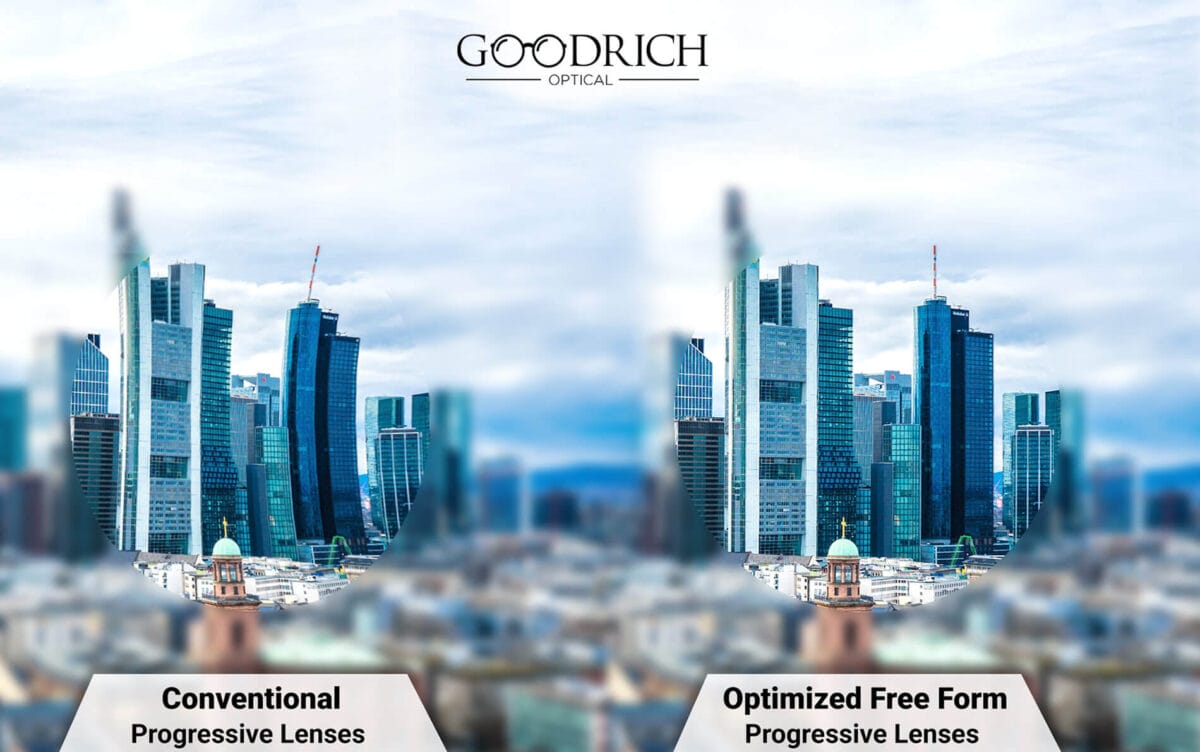

Optimized Free Form progressive lenses from Goodrich Optical are becoming far more popular these days. Primarily because of their visual performance. Couple that with their custom position of wear characteristics and you have unmatched optical performance from your eyewear.
The Technical Answer: Optimized Free Form Progressive lenses are Individually Measured, Computed and Manufactured Progressive Addition Lenses That Use Computer Programs To Run Three-Axis Generators and Polishers Which Provide the Wearer With an Optimized Lens Correction For Their Visual Defect.
Uhh WHAT!? Let me try to make a rather dry, technical subject a little easier to understand.
Free Form is a manufacturing process that allows the creation of complex surface curves and designs with extreme precision. Made using modern computer technologies that allow you to achieve better vision They are the most popular type of high-definition lenses.
Position of wear is the term used to describe the differences in how the glasses fit on your face, compared to the phoropter in the exam room. At Goodrich Optical, we use your position of wear compensated Rx to provide you with the best representation of the doctor’s prescription in the glasses you wear.
To understand why we do this, compare this brief list of differences between the refraction done in the doctor’s exam room and those found in the fitted glasses as you wear them.
Position of wear compensation applies these values to the doctor’s findings when determining the adjusted values to be used in creating the lenses. An optimization program takes the doctor’s prescription, combines it with the patient’s unique position of wear values and recalculates a prescription that “compensates” for these differences. Referred to as the “Compensated Rx”. The result is a much more precise representation of the doctor’s prescription which creates lens performance not achievable with standard lens design methods.
A Standard lens begins as a semi-finished, pre-molded lens that already has a particular progressive design molded on the front surface. In the manufacturing lab, the prescription will be generated on the back surface of the lens and the mold is not altered.
Optimized Free Form lenses are made using software that calculates the person’s prescription when combined with the patients position of wear measurements. This allows Optimized Free Form lenses to be digitally ground to each individual patients, individual eye.
Similar lens characteristics to Optimized Free Form but created using a set of average values (Default) for the position of wear compensations. While an improvement over standard lenses, they do not offer the precision optics of their Optimized counterparts and are often used by places that do not have the knowledge or training to collect the accurate position of wear measurements needed to create Optimized Free Form lenses.
To understand the difference, consider the improvements in TV technology. First, there was analog TV. That would be the lenses you wear now. Then came HD TV with its’ higher resolution. Consider that a Free-Form or HD lenses. Today you can buy a UHD TV with a picture like no other. That is what Optimized Free Form lenses represent. Imagine having the same experience with your glasses. Sure, you can probably see fine with the glasses you have, just like watching analog TV was fine when that was all you had.
While there are many, here are a few of the benefits that Optimized Free Form lenses from Goodrich Optical have to offer:
Each lens is custom created using the unique position of wear measurements our opticians collect. Now you can select that trendy fashion frame you saw in our office and using Optimized Free Form technology, we will custom tailor the lenses to your prescription.
Optimized Free Form technology creates lenses with increased visual performance, allowing you to see better than ever before, at any distance.
Optimized Free Form lenses are able to be created in a multitude of prescriptions, including extremely strong prescriptions. In fact, stronger prescriptions benefit even more from Free Form designs.
Optimized Free Form design technology creates lenses that are not only optically better, they are aesthetically better as well. With thinner, lighter lenses with less apparent “swim”.
There has been a huge increase in the number of people requesting Free Form progressive lenses at Goodrich Optical, and they are a great choice for many. If you have a strong or unusual prescription, want the highest visual clarity, or simply are not happy with the vision through your standard progressive lenses, consider giving Free Form Progressive lenses and try.
Do single vision lenses benefit from position of wear compensation? You bet! Stronger prescriptions, those with moderate or greater cylinder power and unique fitting situations all will greatly benefit from POW optimization. They offer clear, natural, distortion-free vision, all the way to the edge of the lens.